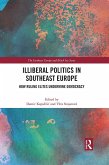Liberal Parties in Europe (eBook, PDF)
Redaktion: Haute, Emilie van; Close, Caroline
42,95 €
42,95 €
inkl. MwSt.
Sofort per Download lieferbar

21 °P sammeln
42,95 €
Als Download kaufen

42,95 €
inkl. MwSt.
Sofort per Download lieferbar

21 °P sammeln
Jetzt verschenken
Alle Infos zum eBook verschenken
42,95 €
inkl. MwSt.
Sofort per Download lieferbar
Alle Infos zum eBook verschenken

21 °P sammeln
Liberal Parties in Europe (eBook, PDF)
Redaktion: Haute, Emilie van; Close, Caroline
- Format: PDF
- Merkliste
- Auf die Merkliste
- Bewerten Bewerten
- Teilen
- Produkt teilen
- Produkterinnerung
- Produkterinnerung

Bitte loggen Sie sich zunächst in Ihr Kundenkonto ein oder registrieren Sie sich bei
bücher.de, um das eBook-Abo tolino select nutzen zu können.
Hier können Sie sich einloggen
Hier können Sie sich einloggen
Sie sind bereits eingeloggt. Klicken Sie auf 2. tolino select Abo, um fortzufahren.

Bitte loggen Sie sich zunächst in Ihr Kundenkonto ein oder registrieren Sie sich bei bücher.de, um das eBook-Abo tolino select nutzen zu können.
This book investigates how liberal parties have evolved over time as a party family, in a comparative perspective. Through a discussion of the applicability of the concept of party family to liberal parties, it gives a better picture of the development, challenges and opportunities for liberal parties in Europe.
- Geräte: PC
- mit Kopierschutz
- eBook Hilfe
- Größe: 10.69MB
Andere Kunden interessierten sich auch für
![Ideological Flexibility of Political Parties in the Era of Transnational Cleavage (eBook, PDF) Ideological Flexibility of Political Parties in the Era of Transnational Cleavage (eBook, PDF)]() Alessio ScopellitiIdeological Flexibility of Political Parties in the Era of Transnational Cleavage (eBook, PDF)41,95 €
Alessio ScopellitiIdeological Flexibility of Political Parties in the Era of Transnational Cleavage (eBook, PDF)41,95 €![Routledge Revivals: Hungary: The Politics of Transition (1995) (eBook, PDF) Routledge Revivals: Hungary: The Politics of Transition (1995) (eBook, PDF)]() Routledge Revivals: Hungary: The Politics of Transition (1995) (eBook, PDF)24,95 €
Routledge Revivals: Hungary: The Politics of Transition (1995) (eBook, PDF)24,95 €![The Far Right in America (eBook, PDF) The Far Right in America (eBook, PDF)]() Cas MuddeThe Far Right in America (eBook, PDF)21,95 €
Cas MuddeThe Far Right in America (eBook, PDF)21,95 €![Parties and Party Systems in Liberal Democracies (eBook, PDF) Parties and Party Systems in Liberal Democracies (eBook, PDF)]() Parties and Party Systems in Liberal Democracies (eBook, PDF)51,95 €
Parties and Party Systems in Liberal Democracies (eBook, PDF)51,95 €![Illiberal Politics in Southeast Europe (eBook, PDF) Illiberal Politics in Southeast Europe (eBook, PDF)]() Illiberal Politics in Southeast Europe (eBook, PDF)44,95 €
Illiberal Politics in Southeast Europe (eBook, PDF)44,95 €![Elections and Public Opinion in Turkey (eBook, PDF) Elections and Public Opinion in Turkey (eBook, PDF)]() Elections and Public Opinion in Turkey (eBook, PDF)44,95 €
Elections and Public Opinion in Turkey (eBook, PDF)44,95 €![Canadian Conservative Political Thought (eBook, PDF) Canadian Conservative Political Thought (eBook, PDF)]() Canadian Conservative Political Thought (eBook, PDF)37,95 €
Canadian Conservative Political Thought (eBook, PDF)37,95 €-
-
-
This book investigates how liberal parties have evolved over time as a party family, in a comparative perspective. Through a discussion of the applicability of the concept of party family to liberal parties, it gives a better picture of the development, challenges and opportunities for liberal parties in Europe.
Dieser Download kann aus rechtlichen Gründen nur mit Rechnungsadresse in A, B, BG, CY, CZ, D, DK, EW, E, FIN, F, GR, HR, H, IRL, I, LT, L, LR, M, NL, PL, P, R, S, SLO, SK ausgeliefert werden.
Produktdetails
- Produktdetails
- Verlag: Taylor & Francis eBooks
- Seitenzahl: 412
- Erscheinungstermin: 12. Februar 2019
- Englisch
- ISBN-13: 9781351245494
- Artikelnr.: 55276345
- Verlag: Taylor & Francis eBooks
- Seitenzahl: 412
- Erscheinungstermin: 12. Februar 2019
- Englisch
- ISBN-13: 9781351245494
- Artikelnr.: 55276345
- Herstellerkennzeichnung Die Herstellerinformationen sind derzeit nicht verfügbar.
Caroline Close is an Assistant Professor at SciencePo ULB, Centre d'étude de la vie politique (Cevipol), Université libre de Bruxelles (ULB). Her main research interests are party organization, intraparty politics, party ideology, legislative studies, elections, and democratic innovations. Emilie van Haute is an Associate Professor and Chair of SciencePo ULB and conducts her research at Centre d'étude de la vie politique (Cevipol), Université libre de Bruxelles (ULB). Her main research interests include party membership, intra-party dynamics, participation, elections, and voting behaviour.
Introduction Part I: Case studies Chapter 1: The Norwegian Left and the
Finnish Centre: What, no capital 'L' liberal parties? Chapter 2: The Danish
Liberal Parties Chapter 3: The Centre Party and the Liberals: The Swedish
members of the liberal party family? Chapter 4: Liberalism in the
Netherlands: The VVD and D66 Chapter 5: Belgian Liberals: Living apart
together... Chapter 6: Diversity, unity, and beyond: The Swiss Liberals
Chapter 7: Liberal parties in Austria Chapter 8: It's (not only) the
economy, stupid?: Past and future of the German Liberal Party Chapter 9:
The UK Liberal Democrats: Liberalism at a crossroads Chapter 10: Fianna
Fáil: In the Liberals but not of the Liberals Chapter 11: Nuanced
liberalism: The weakness of liberal parties in Spain Chapter 12: Liberal
parties in Central and Eastern Europe: Between success and failure Chapter
13: Latvia, Lithuania, and Estonia Chapter 14: The Liberals in Europe: The
alliance of Liberals and Democrats for Europe Part II: Comparative
perspective on liberal parties in Europe Chapter 15: Liberal parties and
elections: Electoral performances and voters' profiles Chapter 16:
Governmental participation and alliances of liberal parties in Europe
Chapter 17: The liberal party family ideology: Distinct, but diverse
Chapter 18: How liberal parties organise Liberal parties in Europe:
Conclusion
Finnish Centre: What, no capital 'L' liberal parties? Chapter 2: The Danish
Liberal Parties Chapter 3: The Centre Party and the Liberals: The Swedish
members of the liberal party family? Chapter 4: Liberalism in the
Netherlands: The VVD and D66 Chapter 5: Belgian Liberals: Living apart
together... Chapter 6: Diversity, unity, and beyond: The Swiss Liberals
Chapter 7: Liberal parties in Austria Chapter 8: It's (not only) the
economy, stupid?: Past and future of the German Liberal Party Chapter 9:
The UK Liberal Democrats: Liberalism at a crossroads Chapter 10: Fianna
Fáil: In the Liberals but not of the Liberals Chapter 11: Nuanced
liberalism: The weakness of liberal parties in Spain Chapter 12: Liberal
parties in Central and Eastern Europe: Between success and failure Chapter
13: Latvia, Lithuania, and Estonia Chapter 14: The Liberals in Europe: The
alliance of Liberals and Democrats for Europe Part II: Comparative
perspective on liberal parties in Europe Chapter 15: Liberal parties and
elections: Electoral performances and voters' profiles Chapter 16:
Governmental participation and alliances of liberal parties in Europe
Chapter 17: The liberal party family ideology: Distinct, but diverse
Chapter 18: How liberal parties organise Liberal parties in Europe:
Conclusion
Introduction Part I: Case studies Chapter 1: The Norwegian Left and the
Finnish Centre: What, no capital 'L' liberal parties? Chapter 2: The Danish
Liberal Parties Chapter 3: The Centre Party and the Liberals: The Swedish
members of the liberal party family? Chapter 4: Liberalism in the
Netherlands: The VVD and D66 Chapter 5: Belgian Liberals: Living apart
together... Chapter 6: Diversity, unity, and beyond: The Swiss Liberals
Chapter 7: Liberal parties in Austria Chapter 8: It's (not only) the
economy, stupid?: Past and future of the German Liberal Party Chapter 9:
The UK Liberal Democrats: Liberalism at a crossroads Chapter 10: Fianna
Fáil: In the Liberals but not of the Liberals Chapter 11: Nuanced
liberalism: The weakness of liberal parties in Spain Chapter 12: Liberal
parties in Central and Eastern Europe: Between success and failure Chapter
13: Latvia, Lithuania, and Estonia Chapter 14: The Liberals in Europe: The
alliance of Liberals and Democrats for Europe Part II: Comparative
perspective on liberal parties in Europe Chapter 15: Liberal parties and
elections: Electoral performances and voters' profiles Chapter 16:
Governmental participation and alliances of liberal parties in Europe
Chapter 17: The liberal party family ideology: Distinct, but diverse
Chapter 18: How liberal parties organise Liberal parties in Europe:
Conclusion
Finnish Centre: What, no capital 'L' liberal parties? Chapter 2: The Danish
Liberal Parties Chapter 3: The Centre Party and the Liberals: The Swedish
members of the liberal party family? Chapter 4: Liberalism in the
Netherlands: The VVD and D66 Chapter 5: Belgian Liberals: Living apart
together... Chapter 6: Diversity, unity, and beyond: The Swiss Liberals
Chapter 7: Liberal parties in Austria Chapter 8: It's (not only) the
economy, stupid?: Past and future of the German Liberal Party Chapter 9:
The UK Liberal Democrats: Liberalism at a crossroads Chapter 10: Fianna
Fáil: In the Liberals but not of the Liberals Chapter 11: Nuanced
liberalism: The weakness of liberal parties in Spain Chapter 12: Liberal
parties in Central and Eastern Europe: Between success and failure Chapter
13: Latvia, Lithuania, and Estonia Chapter 14: The Liberals in Europe: The
alliance of Liberals and Democrats for Europe Part II: Comparative
perspective on liberal parties in Europe Chapter 15: Liberal parties and
elections: Electoral performances and voters' profiles Chapter 16:
Governmental participation and alliances of liberal parties in Europe
Chapter 17: The liberal party family ideology: Distinct, but diverse
Chapter 18: How liberal parties organise Liberal parties in Europe:
Conclusion







